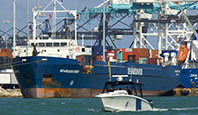
Certificate of Origin
A certificate of origin is an official document, signed by the exporter, certifying the country of origin for each product contained in the shipment. With lower-value shipments (e.g., those under $1,000) customs officials will accept the country-of-origin information on the commercial invoice. Shippers may want to include a certificate of origin with larger-value shipments to ensure that nothing is held up in customs because of insufficient documentation. You can find sample certificates of origin, including the NAFTA Certificate of Origin, on export.gov, in the “International Logistics” section.

USMCA Certificate of Origin Form.
The United States, Mexico, and Canada updated NAFTA to create the new USMCA. USMCA is mutually beneficial for North American workers, farmers, ranchers, and businesses. The new agreement, which entered into force on July 1, 2020, will create a more balanced environment for trade, will support high-paying jobs for Americans, and will grow the North American economy. Download Sample COO: https://bit.ly/3doVo5L

Commercial Invoice
The country of origin is listed on two documents used during shipping: the commercial invoice and the certificate of origin. Every shipment must include a commercial invoice that lists the country of origin for each product it contains; the information on that invoice will be used to determine the tariff rates for exports. You can view samples of commercial invoices on export.gov, in the “International Logistics” section.

The Doral Chamber of Commerce
The Doral Chamber of Commerce, Inc. is an IRS approved 501c(6), Registered Florida non-profit corporation. Occasionally, a country’s customs authority requests that the certificate of origin be certified by the exporter’s chamber of commerce. If this happens, contact your local chamber for details on obtaining certification. For more information about this process, contact your local U.S. Export Assistance Center (buyusa.gov).


